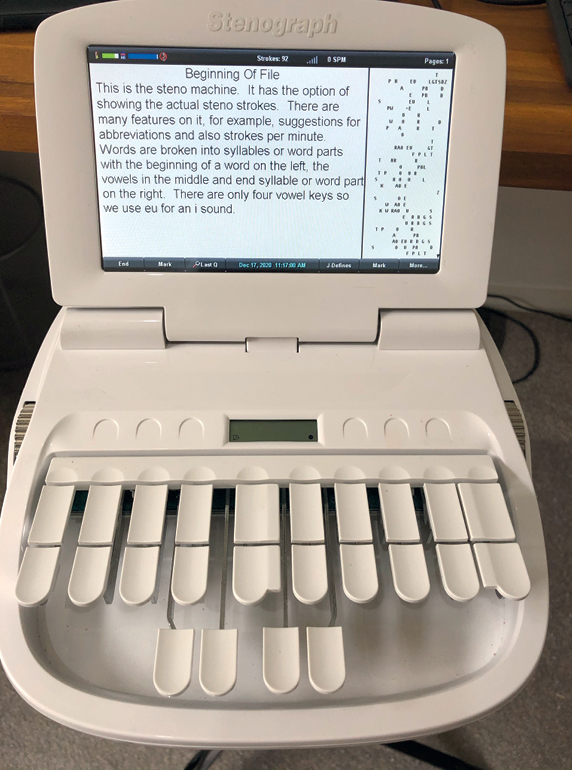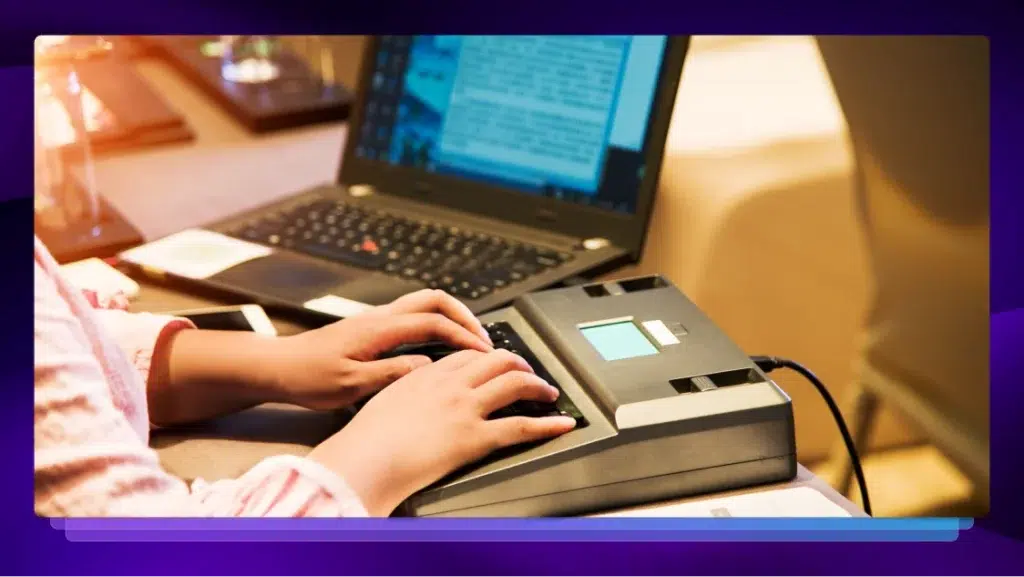Differences Between a Court Typist and a Court Reporter
Differences Between a Court Typist and a Court Reporter
Blog Article
Discovering the Day-to-Day Responsibilities of a Court Typist in the Judicial System
As you browse the intricate globe of the judicial system, you might find yourself curious concerning the role of a court typist. This position is greater than just typing; it entails recording every word talked during process with accuracy. Each day offers distinct obstacles and duties that are essential for keeping the honesty of lawful papers. Comprehending what a court typist does can disclose insights right into the wider operations of justice. What does it take to succeed in this duty?
Review of the Court Typist Duty
As you tip right into the role of a court typist, you'll discover it is important to recognize the vital responsibilities included. You'll serve as a vital web link in the judicial process, making certain that all talked words throughout court process are precisely caught and recorded. Your job supports the stability of the legal system, making your attention to detail imperative.You'll operate specific transcription tools, transforming audio recordings into composed records. Being familiar with lawful terms and court procedures is vital, as you'll commonly come across complicated language and jargon.You'll additionally require to keep confidentiality and deal with delicate info with treatment. Your function requires you to work successfully under pressure, commonly with limited deadlines, while staying focused on creating clear, specific records. As a court typist, you play a vital function in protecting the official document of court process, contributing considerably to the overall functioning of the judiciary.

Key Obligations of a Court Typist
While you'll often be concentrated on recording talked words during court process, your key duties as a court typist expand far past transcription. You'll prepare and keep exact documents of court activities, guaranteeing they show every information of the procedures. You'll likewise style records, such as legal briefs and summons, sticking to strict guidelines and deadlines.In addition, you'll arrange and handle case documents, making it less complicated for courts and lawyers to accessibility vital details rapidly. You're anticipated to proofread and modify records for quality and precision, which is crucial for the integrity of lawful proceedings.Moreover, you'll work carefully with courts, clerks, and attorneys, preserving open communication to attend to any discrepancies or requests. Your role is crucial in guaranteeing that the judicial procedure runs efficiently, giving a trustworthy written account of what transpires in the court.
Essential Skills for Court Typists
As a court typist, you require to understand both typing rate and precision to maintain up with the demands of the court room. Experience with legal terms is also crucial, as it ensures you precisely record the process. These skills not just improve your efficiency however likewise add to the total efficiency of the legal process.
Keying In Speed and Precision
Keying in rate and accuracy are important abilities that every court typist need to understand to assure the stability and performance of legal documents. You require to type quickly yet meticulously, as even minor errors can bring about substantial misconceptions in lawful contexts. A high typing rate enables you to keep up with hectic court proceedings, guaranteeing that every word is caught accurately. Exercising frequently can assist you boost your speed, while concentrating on accuracy helps minimize errors. Making use of devices like dictation software application or message expanders can also increase your efficiency. Keep in mind, your function is important in maintaining exact documents, so sharpening these abilities not just advantages you however likewise sustains the whole judicial process.
Legal Terminology Efficiency
Grasping legal terms is vital for court typists to guarantee efficient and precise documents. You require to familiarize yourself with various lawful expressions, jargon, and concepts generally made use of in court procedures. This knowledge assists you record recordings and draft records with precision. When you understand terms like "plaintiff," "offender," and "subpoena," you'll reduce the chances of mistakes that could jeopardize legal proceedings.Additionally, being skilled in legal terms increases your self-confidence while working along with judges, lawyers, and various other legal experts. You'll find it less complicated to follow discussions and properly catch the significance of what's being claimed. court typist. Continuous knowing and method will certainly improve your skills, making you a useful property in the judicial system
Devices and Innovation Made Use Of by Court Typists
As a court typist, you count on various tools and modern technology to do your responsibilities efficiently. You'll require essential inputting equipment, easy to use software applications, and audio transcription devices to keep pace with the demands of your work. Let's discover exactly how each of these elements plays an essential duty in your day-to-day jobs.
Important Inputting Equipment
While court typists depend heavily on their abilities, the ideal devices is vital for efficiency and precision. To start with, a top notch keyboard is essential for fast and accurate typing, allowing you to maintain rate with courtroom proceedings. Ergonomic designs can assist protect against strain throughout long sessions. A trustworthy computer with ample handling power guarantees smooth operation, especially when dealing with large files (court typist). You'll additionally require a good printer for generating clear duplicates of records. Noise-canceling headphones can be useful throughout recordings, aiding you concentrate on audio clearness. Additionally, a comfortable chair and an efficient work space promote performance. With the best devices, you can enhance your inputting capabilities and support the judicial process efficiently
Software Application Applications Made Use Of
To efficiently record court proceedings, you'll depend on a range of specialized software program applications made for accuracy and speed. These programs frequently consist of data processing software application, which aids you format documents rapidly and properly. You'll additionally utilize legal-specific software application that helps in managing situation data and preserving documents, ensuring you can quickly access vital information.Another necessary tool is real-time transcription software, allowing you to create transcripts as the proceedings unravel. In addition, you may next page use document administration systems to arrange and fetch documents easily. With these applications, you'll enhance your productivity and keep the high requirements needed in the judicial system, permitting you to focus on your inputting abilities and the job available.

Audio Transcription Tools
Court typists commonly depend on a range of audio transcription devices to boost the accuracy of their work. These devices help you convert talked words into composed text efficiently. You may use software program like Dragon NaturallySpeaking or Otter.ai, which use voice acknowledgment abilities, permitting for quick transcription. Additionally, audio playback devices enable you to listen to recordings repetitively, ensuring you catch every detail correctly. Some court typists likewise utilize foot pedals, allowing you control audio playback hands-free while you type. This mix of modern technology not only quickens the transcription procedure however additionally reduces mistakes. Familiarizing on your own with these devices can substantially improve your performance and the high quality of your transcriptions in the fast-paced judicial environment.
Challenges Encountered by Court Typists
Many may check out the function of a court typist as straightforward, you'll promptly discover that it comes with a special collection of challenges. One major obstacle is the fast lane of court process. You'll need to stay on top of fast discussions, which can be frightening, particularly when multiple speakers are included. In addition, the legal jargon made use of in court can be unfamiliar and complex, needing you to frequently learn and adapt.Another difficulty is the pressure of limited due dates. You often need to produce records swiftly, which can lead to anxiety and prospective mistakes. Preserving focus for lengthy durations is necessary, as even a temporary gap can affect your work.Lastly, handling personal details indicates you should always prioritize safety and discernment, adding one more layer of responsibility to your role. Balancing these challenges ends up being crucial for anyone in the placement of a court typist.
The Value of Precision and Focus to Detail
Accuracy and attention to detail are crucial for court typists, as also minor mistakes can bring about significant misunderstandings in lawful process. You are in charge of recording court hearings, lawful records, and various other necessary details, where every word matters. A straightforward typo or misplaced punctuation could alter the meaning of a statement, possibly impacting the outcome of a case.When you concentrate on precision, you aid keep the honesty of the judicial system. Your meticulous work supports legal representatives, judges, and customers by giving accurate and clear records. Interest to detail also reduces the threat of expensive delays and guarantees that all celebrations included have access to reliable documents.
Job Path and Opportunities for Court Typists
Understanding accuracy and focus to information not only enhances your current function but additionally opens up doors to numerous occupation paths for court typists. As you gain experience, you may think about progressing to positions such as lawful assistant or administrative aide in law companies, where your skills in transcription and paper administration will certainly be invaluable.You might also explore opportunities in court reporting, which usually requires additional training YOURURL.com however uses a possibility to engage more straight with courtroom proceedings.If you delight in the administrative side, positions in situation management or legal research could be a wonderful fit.With further education and learning, you may also become a paralegal, assisting lawyers with case preparation.Networking with attorneys can aid you discover surprise opportunities.Ultimately, your foundation as a court typist outfits you with skills that are extensively relevant across the legal landscape, leading the method for a satisfying occupation.
Regularly Asked Inquiries

What Qualifications Are Needed to End Up Being a Court Typist?
To become a court typist, you'll need strong typing skills, knowledge of legal terms, and interest to detail. A secondary school diploma is often called for, and qualifications in transcription can improve your credentials.
Just how Does a Court Typist Manage Confidential Info?
You manage confidential information by complying with stringent protocols, making use of secure systems, and maintaining discernment. You're educated to identify delicate data and guarantee it's saved and shared only with licensed employees, securing the honesty of the information.
What Is the Common Job Atmosphere for Court Typists?
You'll typically find court typists in a formal workplace setting, typically bordered by attorneys. The setting's generally peaceful, focused, and structured, allowing you to focus on transcribing and managing delicate files successfully.
Are Court Typists Required to Take Dictation Throughout Trials?
Yes, court typists commonly take dictation during tests. You'll need to pay attention thoroughly, transcribing legal proceedings precisely and successfully. Your emphasis and speed will certainly assure that more helpful hints every detail is caught for authorities documents.
How Do Court Typists Manage Deadlines During Busy Periods?
During busy durations, you prioritize jobs by organizing your workload and making use of effective keying methods. You established realistic due dates, interact with associates, and remain focused to guarantee all files are completed properly and promptly. While you'll commonly be focused on capturing spoken words during court proceedings, your vital obligations as a court typist extend far beyond transcription. Typing rate and accuracy are necessary skills that every court typist should grasp to assure the stability and effectiveness of lawful documentation. Mastering lawful terms is important for court typists to ensure exact and effective documents. Accuracy and focus to detail are critical for court typists, as also minor blunders can lead to substantial misunderstandings in legal proceedings. court typist. To come to be a court typist, you'll need strong inputting skills, expertise of lawful terminology, and attention to information
Report this page